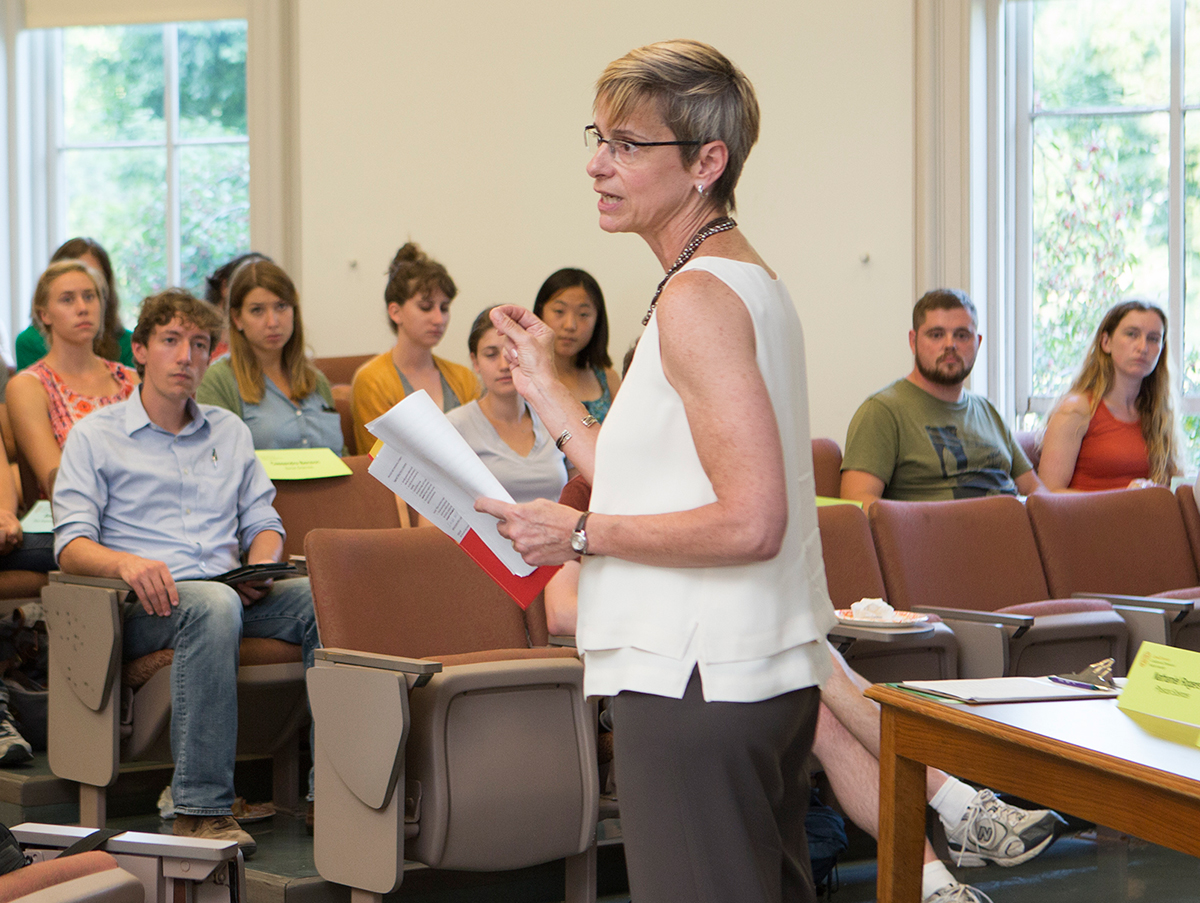Garrett highlights initiatives, progress at GPSA meeting
By Nancy Doolittle

In her first address to Cornell’s Graduate and Professional Student Assembly (GPSA) Aug. 31, President Elizabeth Garrett announced several initiatives to enhance the graduate and professional student experience. These include more than doubling the funding for child care support, increasing the minimum levels for research assistantship stipends, and decreasing the self-pay tuition for Ph.D. students in their sixth or seventh year.
For students with families, Garrett announced that the annual budget for student child care grants will increase from $100,000 to $250,000, increasing the maximum amount per award as well as Cornell’s capacity to support more students and their children.
The minimum rate for research assistantship stipends also will increase, effective this semester, Garrett said, to be equivalent to the minimum teaching assistantship stipend level.
Also effective immediately, tuition for self-pay doctoral students in their sixth and seventh years has been reduced from $11,500 to $3,500 per year, “a significant drop,” Garrett said.
Garrett credited the work of the GPSA for helping to advance the needs of Cornell’s graduate and professional students. She particularly noted the GPSA’s development of a five-year strategic plan in 2013, the Graduate and Professional Community Initiative, which provides a framework to address eight key areas ranging from mental health and well-being to services for students with families. The “thoughtful guidance” that the GPSA and other partners have shared through that plan has influenced her thinking about the university’s priorities going forward, Garrett said.
Garrett highlighted the strengths of Cornell’s graduate programs. At the doctoral level, Cornell completion rates, at around 74 percent, are much higher than the national average of about 57 percent, and Cornell doctoral students’ median time to obtain a degree is about two years less than the national median, she said.
She credited the GPSA’s efforts to recognize outstanding faculty mentors and to provide suggestions about “what we can do to make for truly great faculty-student relationships.”
Garrett also addressed several other areas of student concern.
First, she said, “We recognize the importance of advancing a globally and domestically diverse student population.” Toward New Destinations initiatives “continue to improve the experience of graduate and professional students with diverse identities and communities through fellowships, networking and building community,” she said. Garrett also cited the English Language Support Office and the Colman Leadership Program.
Cornell remains committed to enhancing its graduate and professional student living environment, Garrett said, including addressing housing needs. In this regard, Garrett noted ongoing discussions about the Maplewood site and the new East Hill Village. “We are going to ask for your participation as we go forward in this important project,” she said.
On workers compensation coverage for graduate student assistants, she said, “The university has made it a priority … to satisfy concerns about workers compensation coverage for graduate student assistants who are injured while engaged in activities on the university’s behalf. If a graduate student is injured while at Cornell and that injury meets New York State Workers Compensation eligibility requirements, the student will be covered by Workers Compensation.”
Garrett said the university has expanded the number of university fellowships provided to doctoral students, distributing more than $25 million in stipends, tuition and student health insurance in 2014-15. And “because applying for external fellowships is a significant professional development opportunity for students,” fellowship awards that students receive from outside sources will be supplemented by Cornell funds where needed, Garrett said.
The university remains committed to supporting a variety of career development pathways for graduate students, Garrett said, citing recently enhanced professional development and networking opportunities, and outlining ways the administration and the GPSA can “work together to help to ensure that you and those you represent leave here well prepared and ready for the next step in your professional development.”
Noting the role Cornell alumni can play in helping students explore career options, Garrett referred to recently expanded opportunities for women students to interact with outstanding Cornell alumnae in partnership with the President’s Council of Cornell Women. She said additional funding will be devoted to support student engagement with alumni, including during Alumni Reunion Weekend and through workshops and formal networking events.
Opportunities also are being developed for graduate and professional students to interact with Cornell trustees, Garrett said.
Garrett closed her remarks by reiterating the university’s commitment to meaningful shared governance, and said the GPSA “has been and will remain a vital partner in our shared commitment to achieve academic excellence in all that we do, including the graduate and professional student experience.”
Media Contact
Get Cornell news delivered right to your inbox.
Subscribe